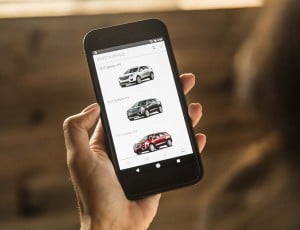
More than 17 million Americans drove off dealer lots with new vehicles last year, and the vast majority of them purchased their new cars, trucks and crossovers the same way motorists have for the past century.
There are alternatives, like leasing, but automakers are exploring even more radical options, some borrowed from the emerging world of online retailing. Ford, for one, said this week it is looking for ways to grow the subscription service, Canvas, that it launched a year ago. That subscription-based service might best be described as a hybrid blend of car buying and car rental, letting a motorist get a vehicle for as long as they want but then return it with just seven days’ notice.

“As car ownership evolves, we see Canvas as part of our suite of products that address changing customer needs in mobility,” said Ford Credit Executive Vice President of Marketing David McClelland. “Canvas is building subscription products that are relevant to consumers today, and it’s building technology for the future, including billing and fleet management, with a nimble approach to product development.”
Ford isn’t the only automaker experimenting with the subscription model. Volvo recently launched a program focused on its new XC40 crossover-utility vehicle. Porsche has a pilot program underway in its U.S. headquarters city of Atlanta. And Cadillac is expanding its subscription program from New York to several other markets, including Atlanta.
(Volvo subscription plan for XC40 starts at $600 a month. Click Here for the story.)

Each of the programs has a unique model. With Ford’s Canvas, a motorist picks a vehicle and then decides how much mileage they’ll likely put on it and whether there will be more than one driver. Prices start at $400 a month and include such things as insurance, maintenance and a roadside warranty, so there are no hidden costs. Like a lease or conventional purchase plan, the customer has 24/7 access to the vehicle but can drop out of the program at any time with just a week’s notice.
Care by Volvo is similar, though it currently focuses on just the XC40, the Swedish automaker waiting to gauge consumer response before deciding whether to add other models.
Like Ford, which operates Canvas in San Francisco and Los Angeles, Porsche and Cadillac are still running limited tests, but they both add twists meant to appeal to high-line buyers. With Book by Cadillac, a customer gets the opportunity to switch between a range of models, such as the sporty Cadillac CTS-V sedan and big Escalade SUV, up to 18 times annually for a monthly fee of $1,800. Porsche offers two pricing tiers, the premium Porsche Passport level, at $3,000 a month, has 22 models to choose from, and a customer could swap every day, should they so choose.
(Learn more about Cadillac extended warranty.)
Expect to see these programs continue to evolve. “Month-to-month subscriptions are just the first step,” said Ned Ryan, who was the founder of Breeze, an early subscription program acquired by Ford and renamed Canvas. “We’ll be focused on adding more customization to the platform, implementing solutions to improve the scalability of the business and offering bigger savings for customers who want longer terms.”

(Click Here to see why Cadillac is all “booked” up.)
Meanwhile, other automakers are exploring whether to add their own subscription programs or come up with other car-buying alternatives.
Hyundai offers an all-inclusive pricing package for its new Ioniq family of electrified vehicles, “and we continue to monitor the industry to see how the subscription models grows and changes,” said Dean Evans, the Korean carmaker’s chief marketing officer. “I do believe there will be many brands that go into the market and try it out.”
An even more radical model is looming on the horizon. A number of industry experts believe that millions of Americans will eventually abandon vehicle ownership entirely, opting, instead, to use ride-sharing services – especially if and when fully driverless vehicles go into use, helping drive down the cost of relying on companies like Uber and Lyft. The Boston Consulting Group recently forecast that 20% of the miles Americans clock on the road will be in vehicles operated by ride-sharing services by 2030.
Tom Doll, the CEO of Subaru of America, is a skeptic, however, arguing that, “Most people still want to have a long-term relationship with just one or two cars parked in their driveway.” There are benefits to using ride-sharing, he said, but you can’t personalize an Uber vehicle, or keep your child’s car seat permanently installed in a Lyft.
(To see if you’re ready to subscribe rather than lease, Click Here.)
That said, Doll and other industry leaders believe American motorists do want alternatives to the conventional car-buying process, and that will push the industry to experiment with plenty of creative alternatives in the coming years.







